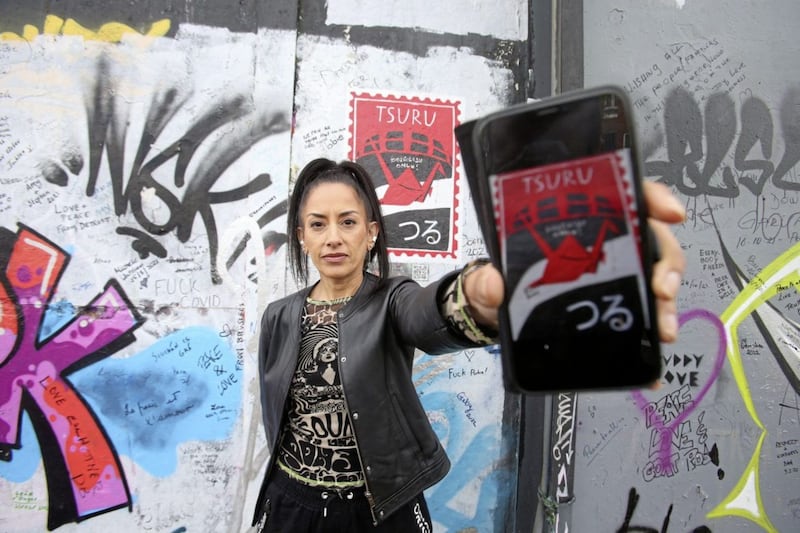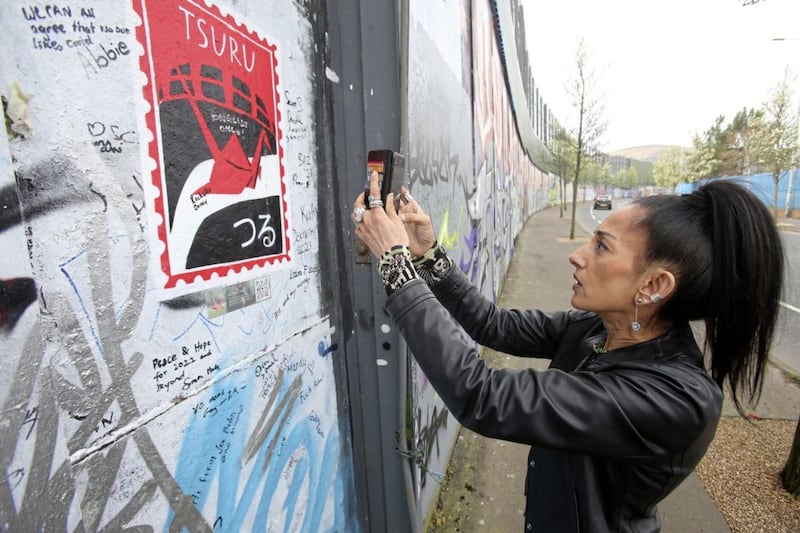TAKING a trip to a peace park in Japan while standing on a Belfast street might seem like a virtual leap too far, but perception and reality have always proved a heady mix for visionary artist, Deepa Mann-Kler.
The chief executive of Belfast creative immersive company, Neon, recently launched her new app, AR Peace Wall, using augmented reality to enhance the visitor experience at the Cupar Way peace wall in the city - and has been happily surprised by the positive feedback so far.
"I think a lot of people are intrigued, in terms of the capability of the technology, specifically because so-called 'Troubles tourism' in Northern Ireland is so significant for the economy," says the artist who received £25,000 in funding through the Creative Industries Seed Fund (a collaboration between the Arts Council and Future Screens NI) to develop the project.
Read more: What is a peace wall?
"Augmented reality (AR) is increasingly being used for marketing or advertising purposes, but for me, here was a unique opportunity to look at how we could use this technology in terms of exploring different approaches to peace-building.
"The link between Belfast and Hiroshima in Japan was interesting in that both places have experienced horrific trauma, but have taken very different approaches. I wanted to look at all of that and also see how we could use voices that have been excluded from the past."
With the technology essentially overlaying a digital image on a physical world, she can see huge potential in AR's capability of allowing us to reimagine public spaces - creating more inclusivity and safely "knocking down barriers" within our own heads.
A collaboration between Neon, Aura Digital, Yellow Design, the Centre for Democracy and Peace Building and Peace Culture Village, Japan, the app symbolically features a red origami crane - 'tsuru' - and tells the story of a little boy on the morning the atomic bomb dropped on Hiroshima in 1945.
At its core is a celebration of survival and how life finds a way to survive against the worst odds - even an unnatural heat 40 times greater than that emitted by the sun. It is, says Deepa, a story of hope.
"When you hold your phone up, you can see the cranes which have been spray-painted alongside different points on the wall and the reason that icon was selected is because the crane is the international symbol for peace building," explains the former TEDx speaker and visiting professor of Immersive Futures with Ulster University.
"The story that unfolds starts with the wall burning away, almost as if you have a match or flame underneath a photograph. The little boy is in Hiroshima Peace Memorial Park and you see a clock - the bomb was dropped at 8.15 in the morning. He is then seen as an older man because that generation is still here - those that survived.
"The visual personifies hope and new life through a bird carrying seed from the surviving Hibakujumoku tree - there are 170 trees that are fenced off in the park and some still bear the scars. It is just remarkable how life and humanity finds a way through."
Successful as it has been, the animated story was originally intended to be something completely different, with Deepa and the team planning to travel to Japan and film the actual peace park "in 360" for a fully immersive experience.
"That couldn't happen because of Covid but the message is still the same," says the Killyleagh-based artist whose Neon Dogs light installation became the glowing totem of Lumiere Derry-Londonderry 2013.
"The original idea was for app users to virtually step into the park and move around with their phone - when the wall is completely gone and there is a peaceful environment.
"When that became impossible, we commissioned the animation in its place, but we've kept some of the shot sequences in terms of camera angles and the way we sweep in."
A former young Olympus and Daily Mirror Photographer of the Year, she is well aware of good angles, but initially chose not to follow her passion for the creative arts - largely in respect of the wishes of her parents who arrived in England in the early 1960s "with nothing" following the partition of India and Pakistan.
Instead, she studied social policy at the London School of Economics.
"Because my parents' experience of racism in England had been so horrific, they really encouraged us to go down an academic career instead of a creative one - even though it was really obvious where my interest lay," says Deepa, who years later authored Out of the Shadows, the first report on race discrimination with recommendations for the public sector in Northern Ireland.
"But, you know, if it's meant for you, you will come back to it and that is what I did, years later."
Working successfully in different mediums, including traditional painting and public art light installations, she stumbled across VR while on a recuperative family break to Iceland and found it a life-enhancing experience following the death of her much-loved father in 2016.
"We were sitting in a café in Reykjavik and there were some girls sitting at the table next to us, talking about the singer, Bjork, and an installation at the Harpa music venue," Deepa recalls.
"My husband has always loved Bjork's music so we booked tickets online and were there that afternoon.
"Bjork was an animated avatar and you could dance with her - it was an utterly immersive experience and it allowed me to be just totally in the moment.
"I get that when I cycle, which I do every day - I am in a flow state. When I came out of it, the heaviness had lifted and I could feel a change."

She returned home and set about finding out more, soon setting up Neon and later developing a prototype with software developers for a pain hackathon in Belfast, experimenting how human breath could impact a virtual reality environment.
"We came up with the idea of a single breath making leaves in a meadow rise and fall and we were able to test it on the day with people suffering from chronic pain," she says.
"The feedback was really good and a further pilot study with people suffering from fibromyalgia and ME revealed that eight out of 10 people reported a de-escalation in pain using VR for as little as three or four minutes. It's about distraction and using your breath and it was such a powerful test case."
Her latest work - Discover ME - is aimed at sufferers of ME and designed primarily as an educational tool for health professionals, while another app has been launched with Hope 4 ME & Fibro support group. She has also worked on apps for Barnardo's and for parents with children with autism.
"AR and VR have many applications across a wide range of fields, from social justice, to health, tourism, entertainment and education," concludes Deepa, a former artist-in-residence with Belfast playwright, Martin Lynch.
"We are really just at the forefront of this technology - and it belongs to everyone. It has the capacity to forge connections, nurture empathy and promote healing through immersive experiences. The possibilities are endless, really."
AR Peace Wall app is on the Visit Belfast website and the BreatheVR virtual reality relaxation app is available on the Oculus Go site.



